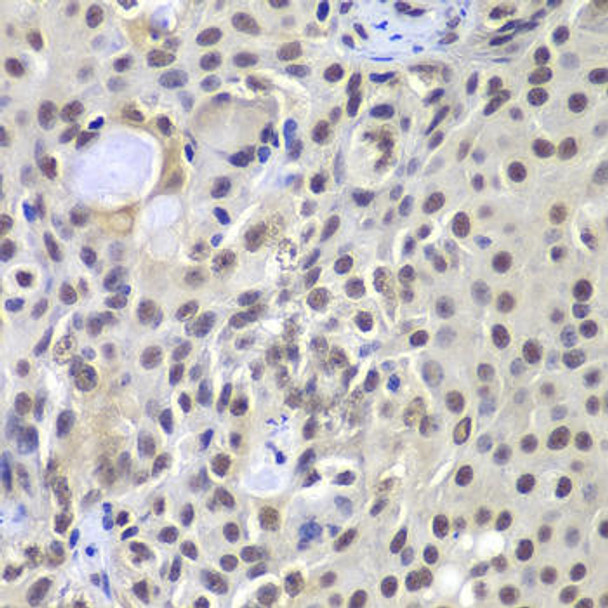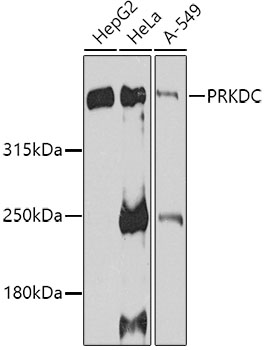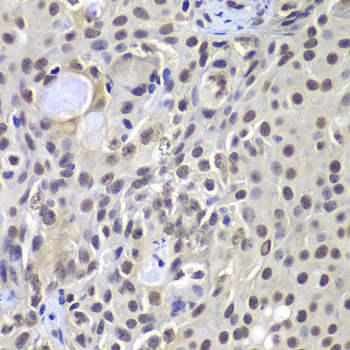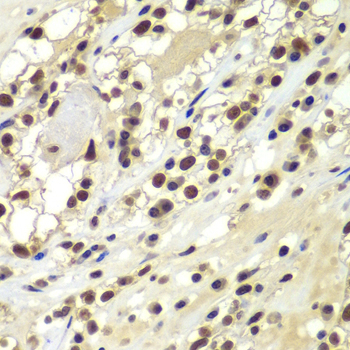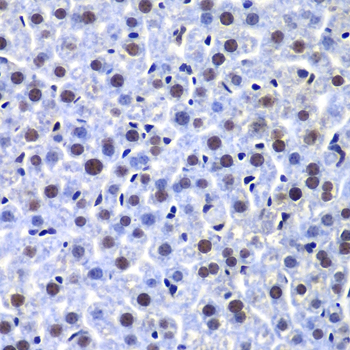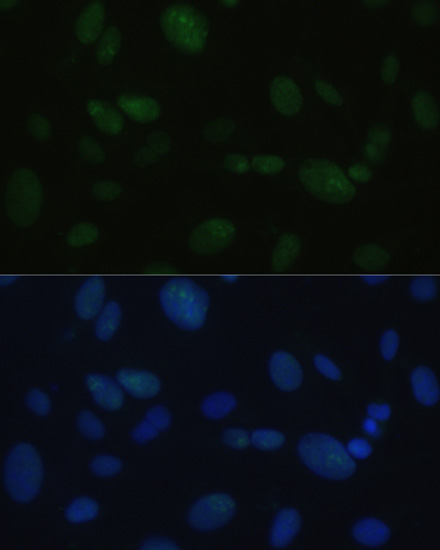Anti-PRKDC Antibody (CAB7716)
- SKU:
- CAB7716
- Product type:
- Antibody
- Reactivity:
- Human
- Mouse
- Host Species:
- Rabbit
- Isotype:
- IgG
- Antibody Type:
- Polyclonal Antibody
- Research Area:
- Cell Biology
Description
| Antibody Name: | Anti-PRKDC Antibody |
| Antibody SKU: | CAB7716 |
| Antibody Size: | 20uL, 50uL, 100uL |
| Application: | WB IHC IF |
| Reactivity: | Human, Mouse |
| Host Species: | Rabbit |
| Immunogen: | A synthetic peptide of human PRKDC |
| Application: | WB IHC IF |
| Recommended Dilution: | WB 1:500 - 1:2000 IHC 1:50 - 1:200 IF 1:50 - 1:200 |
| Reactivity: | Human, Mouse |
| Positive Samples: | HepG2, HeLa, A-549 |
| Immunogen: | A synthetic peptide of human PRKDC |
| Purification Method: | Affinity purification |
| Storage Buffer: | Store at -20°C. Avoid freeze / thaw cycles. Buffer: PBS with 0.02% sodium azide, 50% glycerol, pH7.3. |
| Isotype: | IgG |
| Sequence: | Email for sequence |
| Gene ID: | 5591 |
| Uniprot: | P78527 |
| Cellular Location: | Nucleus, nucleolus |
| Calculated MW: | 465kDa/469kDa |
| Observed MW: | 469kDa |
| Synonyms: | PRKDC, DNA-PKcs, DNAPK, DNPK1, HYRC, HYRC1, IMD26, XRCC7, p350 |
| Background: | This gene encodes the catalytic subunit of the DNA-dependent protein kinase (DNA-PK). It functions with the Ku70/Ku80 heterodimer protein in DNA double strand break repair and recombination. The protein encoded is a member of the PI3/PI4-kinase family. |
| UniProt Protein Function: | DNAPK: an atypical protein kinase of the PIKK family. Involved in DNA nonhomologous end joining (NHEJ) required for double-strand break (DSB) repair and V(D)J recombination. and modulation of transcription. Must be bound to DNA to express its catalytic properties. Promotes processing of hairpin DNA structures in V(D)J recombination by activation of the hairpin endonuclease artemis (DCLRE1C). The assembly of the DNA-PK complex at DNA ends is also required for the NHEJ ligation step. Required to protect and align broken ends of DNA. May also act as a scaffold protein to aid the localization of DNA repair proteins to the site of damage. Found at the ends of chromosomes, suggesting a further role in the maintenance of telomeric stability and the prevention of chromosomal end fusion. Also involved in modulation of transcription. Defects cause severe combined immune deficiency (SCID) which is characterized by a lack of mature functional lymphocytes and a high susceptibility to lethal opportunistic infections. Required for repair of radiation-induced dsDNA breaks. Loss of function in mice or horses leads to the SCID (severe combined immune deficiency) phenotype due to failure of immunoglobulin rearrangement. Target of mutation in mismatch repair-deficient colorectal cancer. Inhibitor: KU-7059. 2 isoforms of the human protein are produced by alternative splicing. |
| UniProt Protein Details: | Protein type:EC 2.7.11.1; Kinase, protein; Protein kinase, Ser/Thr (non-receptor); DNA repair, damage; Protein kinase, atypical; Nucleolus; ATYPICAL group; PIKK family; DNAPK subfamily Chromosomal Location of Human Ortholog: 8q11 Cellular Component: nucleoplasm; transcription factor complex; membrane; nucleolus; DNA-dependent protein kinase complex; cytosol Molecular Function:protein serine/threonine kinase activity; protein binding; enzyme binding; DNA binding; DNA-dependent protein kinase activity; transcription factor binding; ATP binding; protein kinase activity Biological Process: positive regulation of apoptosis; heart development; germ cell programmed cell death; rhythmic process; T cell differentiation in the thymus; double-strand break repair via nonhomologous end joining; negative regulation of protein amino acid phosphorylation; double-strand break repair; positive regulation of interferon type I production; response to gamma radiation; telomere maintenance; pro-B cell differentiation; somitogenesis; immunoglobulin V(D)J recombination; protein destabilization; B cell lineage commitment; protein modification process; regulation of circadian rhythm; DNA repair; double-strand break repair via homologous recombination; peptidyl-serine phosphorylation; T cell lineage commitment; DNA damage response, signal transduction resulting in induction of apoptosis; cellular response to insulin stimulus; innate immune response; T cell receptor V(D)J recombination; positive regulation of transcription from RNA polymerase II promoter; brain development Disease: Immunodeficiency 26 With Or Without Neurologic Abnormalities |
| NCBI Summary: | This gene encodes the catalytic subunit of the DNA-dependent protein kinase (DNA-PK). It functions with the Ku70/Ku80 heterodimer protein in DNA double strand break repair and recombination. The protein encoded is a member of the PI3/PI4-kinase family.[provided by RefSeq, Jul 2010] |
| UniProt Code: | P78527 |
| NCBI GenInfo Identifier: | 38258929 |
| NCBI Gene ID: | 5591 |
| NCBI Accession: | P78527.3 |
| UniProt Secondary Accession: | P78527,P78528, Q13327, Q13337, Q14175, Q59H99, Q7Z611 Q96SE6, Q9UME3, |
| UniProt Related Accession: | P78527 |
| Molecular Weight: | 4128 |
| NCBI Full Name: | DNA-dependent protein kinase catalytic subunit |
| NCBI Synonym Full Names: | protein kinase, DNA-activated, catalytic polypeptide |
| NCBI Official Symbol: | PRKDC |
| NCBI Official Synonym Symbols: | HYRC; p350; DNAPK; DNPK1; HYRC1; IMD26; XRCC7; DNA-PKcs |
| NCBI Protein Information: | DNA-dependent protein kinase catalytic subunit; p460; DNA-PK catalytic subunit; hyper-radiosensitivity of murine scid mutation, complementing 1 |
| UniProt Protein Name: | DNA-dependent protein kinase catalytic subunit |
| UniProt Synonym Protein Names: | DNPK1; p460 |
| UniProt Gene Name: | PRKDC |
| UniProt Entry Name: | PRKDC_HUMAN |

